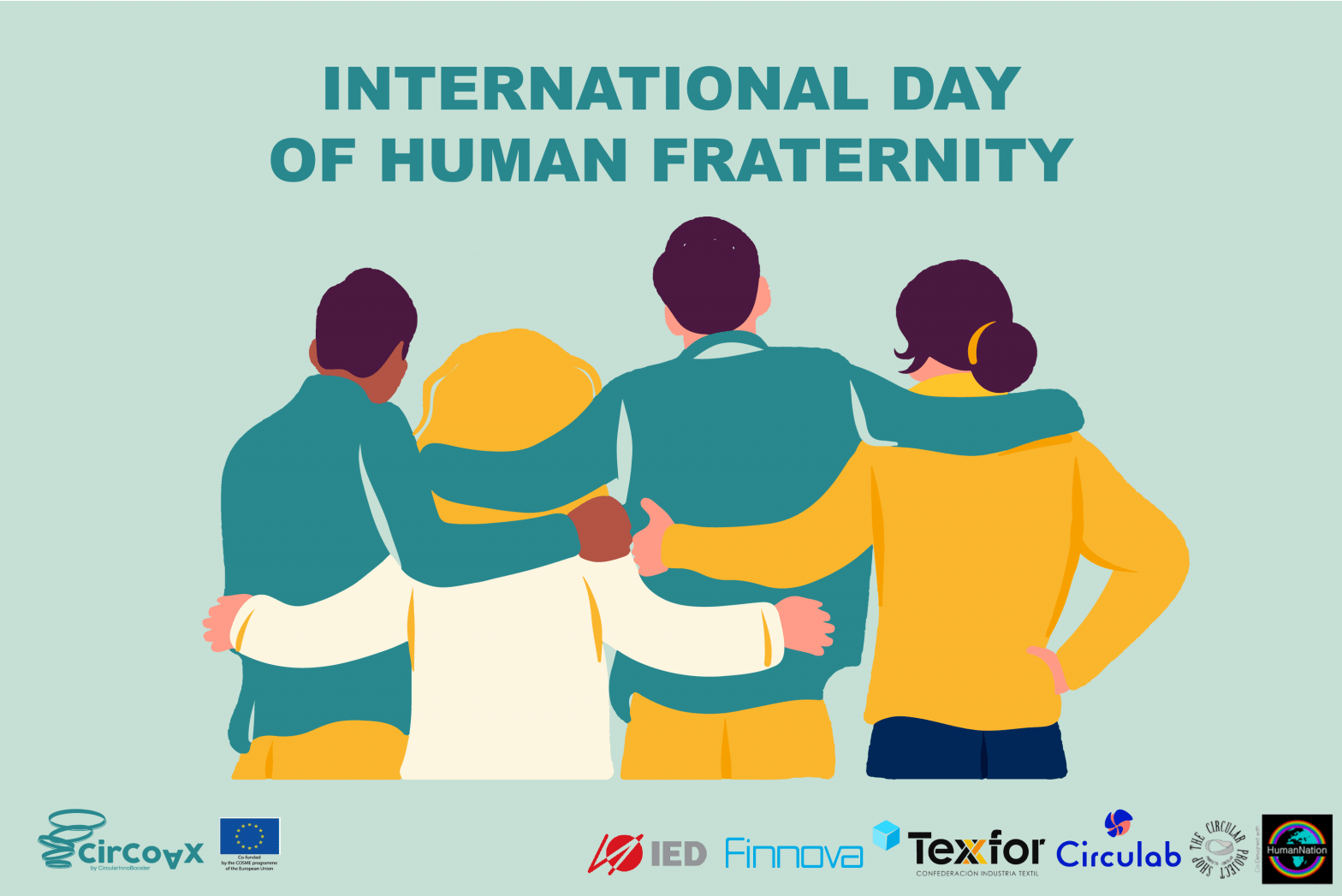Today, Friday 4 February, the United Nations celebrates the International Day of Human Fraternity for Peace and Cooperation, highlighting the importance of sharing values, respecting beliefs and cultures in humanity. From the CircularInnoBooster project and the CirCoAX acceleration programme, we join this celebration emphasizing our commitment to cooperation and empowerment of communities and sectors involved in fashion and textile, through education in sustainability and values.
At CircularInnoBooster we consider it imperative to promote alliances to achieving the circular and regenerative model in the fashion and textile industry. Therefore, one our pillars are on actions promoting an exchange of good practices, values and knowledge in co-creating, co-innovating, co-inventing and cooperating.
In addition to contributing to the need for collaboration, CircularInnoBooster has the responsibility to bring a tolerant and ethical perspective to one of the sectors most involved with the cultural expression of communities, fashion. Fashion has been worsened by the unsustainable model of use, dispose and throw away, losing value, quality, meaning and its essence as an expression of tastes, personalities, customs, peoples and generations. Recovering these invaluable principles in the fashion industry is one of the objectives of the model we want to build with CirCoAX.
The core of the innovative ecosystem created from our acceleration programme will be training in more ethical models, where solidarity, fraternity and the development of a roadmap reconciling us with our shared planet are at the forefront. Thanks to this training, we will empower each of the actors involved in the sector’s value chain, approaching sustainability step by step.
From CircularInnoBooster we believe that the union of our efforts is necessary and that is why we have created the NextextileGeneration cluster together with the other three COSME projects of this call. This initiative compiles information, calls and news, but above all it symbolizes the value and importance we give to cooperation.
About COSME
COSME is the programme for the Competitiveness of Enterprises and Small and Medium-sized Enterprises by the European Commission’s Executive Agency for Small and Medium-sized Enterprises (EASME).
This programme assists SMEs to develop their business models, to receive funds, and to internationalise. This scheme also supports public administrations to enhance the entrepreneurial environment and to facilitate the economic growth of the EU. During the funding period of 2014-2020, this programme allocated €2.3 billion to support SMEs.
About IED
Istituto Europeo di Design is an academic institution working in education, training, and the research of fashion, design, visual communication, and management. IED has offices in Spain (Madrid and Barcelona), Italy (Milan, Rome and five other cities) and Brazil (São Paulo and Rio de Janeiro). IED works in several EU and COSME countries through collaborations and arrangements with institutions, business support organisations, teachers, experts, and mentors. IED has an extensive network of connections in the fashion and textile sector (F&T).
About Finnova Foundation
Finnova is a foundation working to promote and develop innovation and entrepreneurship across the EU. Headquartered in Brussels, it works through collaborations and partnerships across all EU countries. Finnova’s experience in communicating and disseminating European projects is coupled with an extensive and grounded experience in creating businesses and programmes to support enterprises, such as accelerators, incubators, and the selection and organisation of ceremonies and events.
About Texfor
Texfor is a leading textile association in Spain with roughly 400 members. Founded in 2010 and based in Catalonia, Texfor brings together enterprises from the textile value chain, i.e. from weaving to fabrics as well as accessories, textile finishing, printing, and dyeing for the dressmaking industry, textiles for households, and technical and industrial applications. Texfor has an extensive expertise as it has worked in relevant expert committees at an EU level: university and professional training, developing financial capacities, cross-cutting collaboration, fostering RDI, specialised services, and leadership in sustainability focused on the circular economy.
About Circulab
Circulab is a laboratory and design studio specialising in developing transformation methods, tools and programmes to help enterprises adopt circular and sustainable business models. Circulab has designed several tools to implement a circular business model in enterprises. It works in 23 countries – 9 out of them in the EU – and it supports projects via 60 independent entrepreneurial consultants. It applies circular methodologies and tools.
About The Circular Project co-designed with HumanNation
TCP (The Circular Project) favours and promotes a circular and sustainable fashion in different areas, offering the fashion industry a communication strategy based on a cross-cutting and systemic approach of the circular economy. TCP combines social, ethical, environmental, and economic aspects, and has a strong presence as well as connections in the sustainable fashion world. TCP has promoted the Circular Sustainable Fashion Week Madrid, a one-of-a-kind event, and also serves as HQ for the Spanish Association for the Sustainability, Innovation and Circularity in the Fashion Industry. TCP is also ambassador of Sannas (Triple Bottom Line Business Association) and has collaborated with a wide array of Spanish, European, and Latin American institutions and enterprises.
The Circular Project works with HumanNation to co-design and develop CirCoAX. HumanNation is a consultancy enterprise specialising in the development of transformative and disruptive ecosystems of innovation and companies for the ‘new economy’. It is based on the fourth economic sector, the systemic thinking, and co-creation. It raises awareness in organisations and ecosystems to respect the planetary boundaries and the social fabric, creating resilient local economies with a global perspective.

Leave a Reply